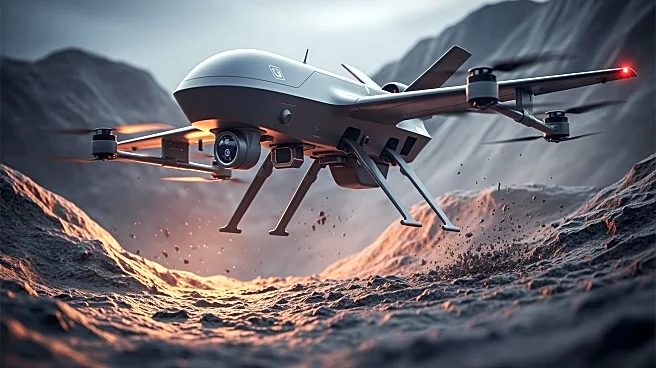What's Happening?
Ukraine's conflict with Russia has led to significant advancements in drone and robot technologies, transforming modern warfare. Both Kyiv and Moscow have developed 'kamikaze' drones capable of targeting fortified positions and supply lines. These technologies have necessitated
a rewrite of traditional military rules, with ultra-thin fiber optic cables enabling remote control without interference. Despite these innovations, Ukraine faces challenges in enhancing its missile defense systems. The conflict underscores the importance of technological ingenuity in warfare, but also highlights the limitations of relying solely on technology for victory.
Why It's Important?
The technological advancements in Ukraine's conflict with Russia have broader implications for global military strategies. The use of drones and robots represents a shift towards more remote and automated warfare, challenging traditional defense systems. This evolution necessitates adaptations in military training and equipment, impacting defense budgets and strategic planning. The reliance on technology also raises ethical questions about the nature of warfare and the potential for increased civilian casualties. As countries observe these developments, they may reconsider their own military strategies and investments in technology.
What's Next?
Ukraine's continued reliance on technological innovations will likely drive further developments in drone and robot warfare. The international community may increase support for Ukraine's defense capabilities, focusing on missile defense systems and counter-drone technologies. The conflict's progression will be closely monitored, with potential diplomatic efforts to broker peace. Additionally, other countries may seek to learn from Ukraine's experiences, adapting their own military strategies to incorporate advanced technologies.
Beyond the Headlines
The conflict in Ukraine highlights the ethical and legal dimensions of modern warfare. The use of drones and robots raises questions about accountability and the impact on civilian populations. The technological shift may influence international laws and norms regarding warfare, prompting discussions on the regulation of autonomous weapons. The long-term implications for global security and military strategies are significant, as countries navigate the balance between technological innovation and ethical considerations.

















